| Srl | Item |
| 1 |
ID:
082226
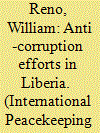

|
|
|
|
|
| Publication |
2008.
|
| Summary/Abstract |
International agencies intervene to promote reform in Liberia with promises to remake the country. Yet elections produce victories for former wartime commanders and officials accused of corruption. Many of these people continue to play important roles in the economy and command vocal followings. International organizations face a choice between a more radical intervention that amounts to a counterinsurgency operation to remove these people from their positions at the risk of creating political instability, and tacit acceptance of their power. Looking beyond these choices, is it possible that corrupt members of the elite and insiders can contribute to economic growth and political stability? Comparison of the organization of corruption in Liberia with models in East Asia indicates that political networks rooted in Liberia's economy may offer the promise of helping to integrate ex-combatants into the economic life of the country and address local demands for participation in politics.
|
|
|
|
|
|
|
|
|
|
|
|
|
|
|
|
| 2 |
ID:
069157
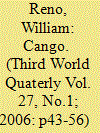

|
|
|
| 3 |
ID:
090447
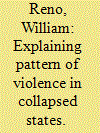

|
|
|
|
|
| Publication |
2009.
|
| Summary/Abstract |
Abstract Analyses of predatory violence that stress individual fighters' pursuits of short-term opportunities for enrichment explain why insurgents seem to be so uninterested in taking time to propagandize, recruit, and organize local populations to fight. International efforts to resolve this kind of conflict often aim to sever this link between resources, conflict, and these short-term goals. Quick opportunities do attract certain kinds of people and shape how they organize and how they fight. But critical cases often are overlooked in analyses linking local resources to propensities for predation. This behaviour may indicate the construction of new institutions that contribute to post-conflict stability such that people with guns obey people without guns. Individual interests are not irrelevant, but present an incomplete picture of the behaviour and organization of insurgents. A more complete explanation entails looking more closely at the relation of insurgents to non-combatants and to the politics of patronage, or the 'state' as it has become in the most extreme examples of state collapse. Historically this obedience to community leadership or to political cadres has been integral to the mobilization of insurgents with political programs and liberated zones, and ultimately,
|
|
|
|
|
|
|
|
|
|
|
|
|
|
|
|
| 4 |
ID:
019259
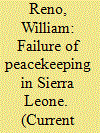

|
|
|
|
|
| Publication |
2001.
|
| Description |
219-225
|
|
|
|
|
|
|
|
|
|
|
|
|
|
|
|
| 5 |
ID:
155237
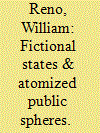

|
|
|
|
|
| Summary/Abstract |
This essay explains why political order in some places gives way to especially persistent conflict and prolonged state institutional collapse. State failure is rooted in decades of personalist rule, as leaders have sought to fragment and disorganize institutions and social groups that they thought would be possible bases of opposition. This problem was considered particular to sub-Saharan Africa, but now parts of the Middle East and Central Asia exhibit this connection between a particular type of authoritarian rule and state failure. State failure in these countries produces multisided warfare that reflects the fragmentation upon which prewar regimes relied for their protection. Policy-makers are thus faced with the dilemma of propping up personalist regimes that present themselves as bulwarks against disorder at the same time that their domestic strategies of governance play a central role in creating the conditions of protracted multisided warfare in the event that they fail.
|
|
|
|
|
|
|
|
|
|
|
|
|
|
|
|
| 6 |
ID:
169939
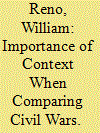

|
|
|
|
|
| Summary/Abstract |
Comparisons of civil wars based on attention to contextual categories do a better job of conceptualising key variables such as ethnic identity, resources, armed group membership, and concepts such as rebellion and negotiation than do studies based on large data sets and methodological individualism. This article shows how important variables and concepts apply in ways that are particular to conflicts that follow the collapse of centralised authority based on personalist networks. Comparisons with civil wars in highly bureaucratised states highlight these differences, and illustrate fallacies of assuming that variables and concepts transcend the broad historical sweep of civil wars.
|
|
|
|
|
|
|
|
|
|
|
|
|
|
|
|
| 7 |
ID:
162253
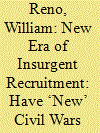

|
|
|
|
|
| Summary/Abstract |
This article surveys the way in which political scientists and non-traditional scholars have analysed insurgencies and counterinsurgencies. We contend that insurgent recruitment is different in ‘new’ wars due to globalisation. We note continuity in ‘old’ and ‘new’ civil wars, but that collapsed states and the ascent of new types of insurgents with different power bases is markedly different from a pre-globalised era. While there is nothing new about the concept of contemporary insurgent recruiting processes, recruitment efforts have shifted towards a global audience, drastically changing the context and character of these wars and the ways in which they are waged.
|
|
|
|
|
|
|
|
|
|
|
|
|
|
|
|
| 8 |
ID:
081512
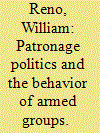

|
|
|
|
|
| Publication |
2007.
|
| Summary/Abstract |
The structures of pre-conflict patronage politics in West Africa play a major role in shaping the organization and behavior of armed groups that have appeared in that region since the 1990s. Patronage networks provide the social context in which armed group leaders arise and influences how they obtain and use resources. It weighs heavily in influencing who they recruit and how fighters and leaders define their goals. Two general principles emerge out of this investigation. First, political leaders who enjoyed close ties to prewar capital-based patronage networks tend to organize predatory armed groups. Leaders who come from communities that were marginal to these networks organize armed groups that are more likely to benefit local communities and take community norms more seriously. Overall, the latter maintain more stable internal organizations and are less prone to commit extreme human rights violations, at least in comparison to their better connected rivals. Evidence indicates that leaders of these groups often are tempted to pursue more predatory strategies. They discover, however, that this social context in which they gather resources and recruit fighters inhibits the pursuit of such strategies
|
|
|
|
|
|
|
|
|
|
|
|
|
|
|
|
| 9 |
ID:
161527
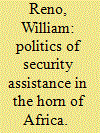

|
|
|
|
|
| Summary/Abstract |
This examination of international security assistance to Somalia points to the deficiencies of conventional security assistance strategies to partners in failed states and considers elements of an ad hoc alternative security assistance strategy. The social relationships among that state failure creates undermine the political will and capacity of recipients to utilize security assistance as providers intend. This consideration of developments in Somalia shows how domestic partners act in ways that frustrate efforts to build domestic security institutions. That record is manifest in persistent insurgent activities, even in Somalia’s capital city. The second part of this article explains how pragmatic efforts to fight Somalia’s Al-Shabaab insurgents create the outlines of an alternative security assistance strategy that bypasses elements of Somalia’s formal government structure and opts instead to rely on the creation of parallel security forces. While this strategy addresses a need to meet security objectives in the political environment of a failed state, it elevates tactical proficiency at the expense of strategic aims of conventional security assistance programs.
|
|
|
|
|
|
|
|
|
|
|
|
|
|
|
|
| 10 |
ID:
115620
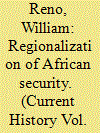

|
|
|
|
|
| Publication |
2012.
|
| Summary/Abstract |
From the perspective of officials in Africa, participating in regional conflict management is now one of the best ways for governments . . . to get international resources to strengthen their own authority.
|
|
|
|
|
|
|
|
|
|
|
|
|
|
|
|
| 11 |
ID:
086194
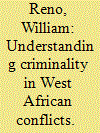

|
|
|
|
|
| Publication |
2009.
|
| Summary/Abstract |
Most standard analyses and policies aimed at peacekeeping and post-conflict reconstruction in West Africa understand members of armed groups, and especially their leaders who engaged in illicit commerce, as criminals. This analysis and the policies that follow from it miss the extent to which these transactions now contribute to the construction of new political relationships and are seen by those who participate in them as one of the few avenues for active participation in the post-war economy and politics. This article explains how illicit commerce underlies new political relationships in West Africa. It shows how measures to disrupt these transactions can destabilize politics. But often those who participate in illicit markets prove able to manipulate externally imposed measures and assert their own interests.
|
|
|
|
|
|
|
|
|
|
|
|
|
|
|
|
| 12 |
ID:
001375
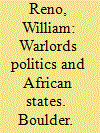

|
|
|
|
|
| Publication |
Boulder, Lynne Rienner, 1998.
|
| Description |
xx, 257p.
|
| Standard Number |
1555876740
|
|
|
|
|
|
|
|
|
|
|
|
Copies: C:1/I:0,R:0,Q:0
Circulation
| Accession# | Call# | Current Location | Status | Policy | Location |
| 040877 | 320.96/REN 040877 | Main | On Shelf | General | |
|
|
|
|